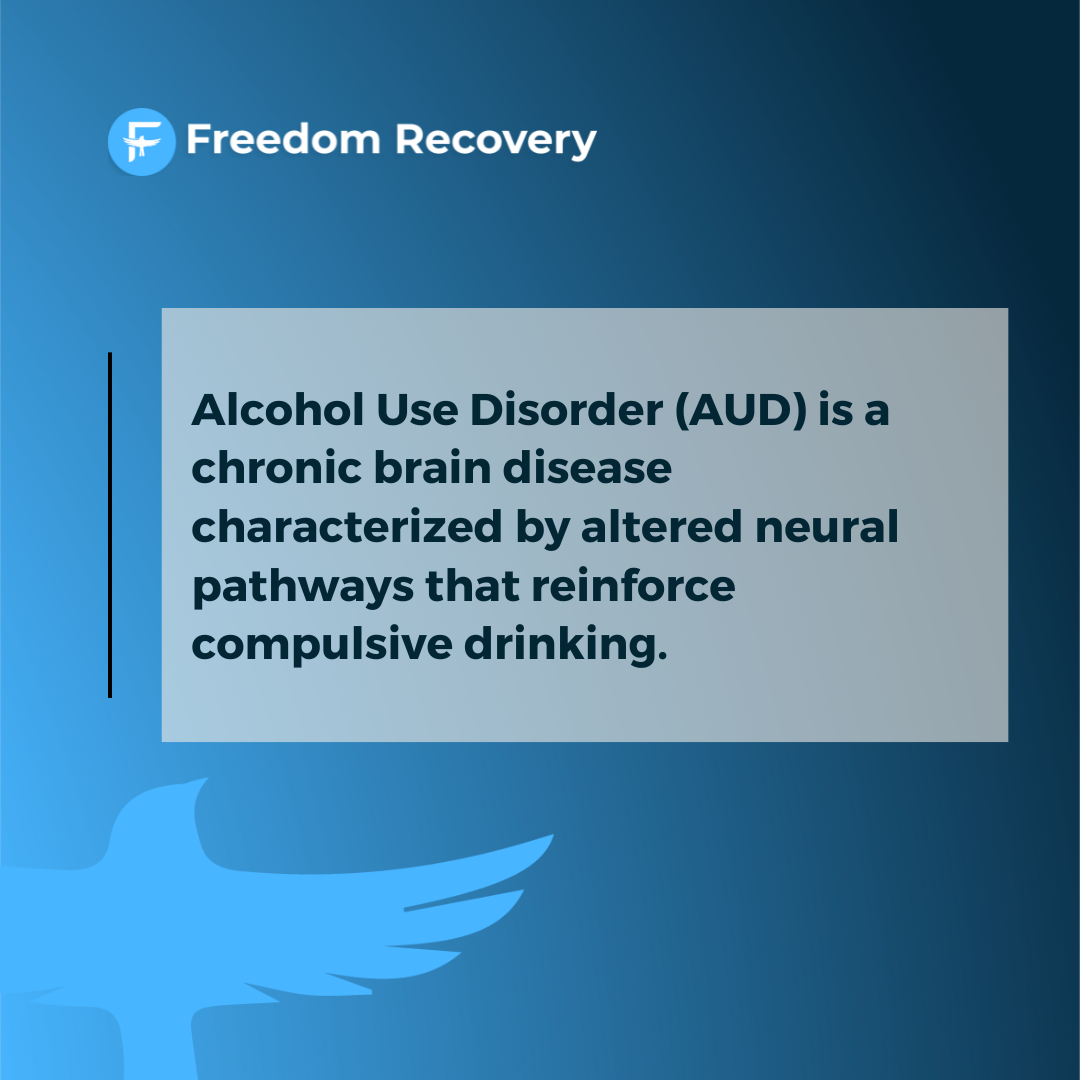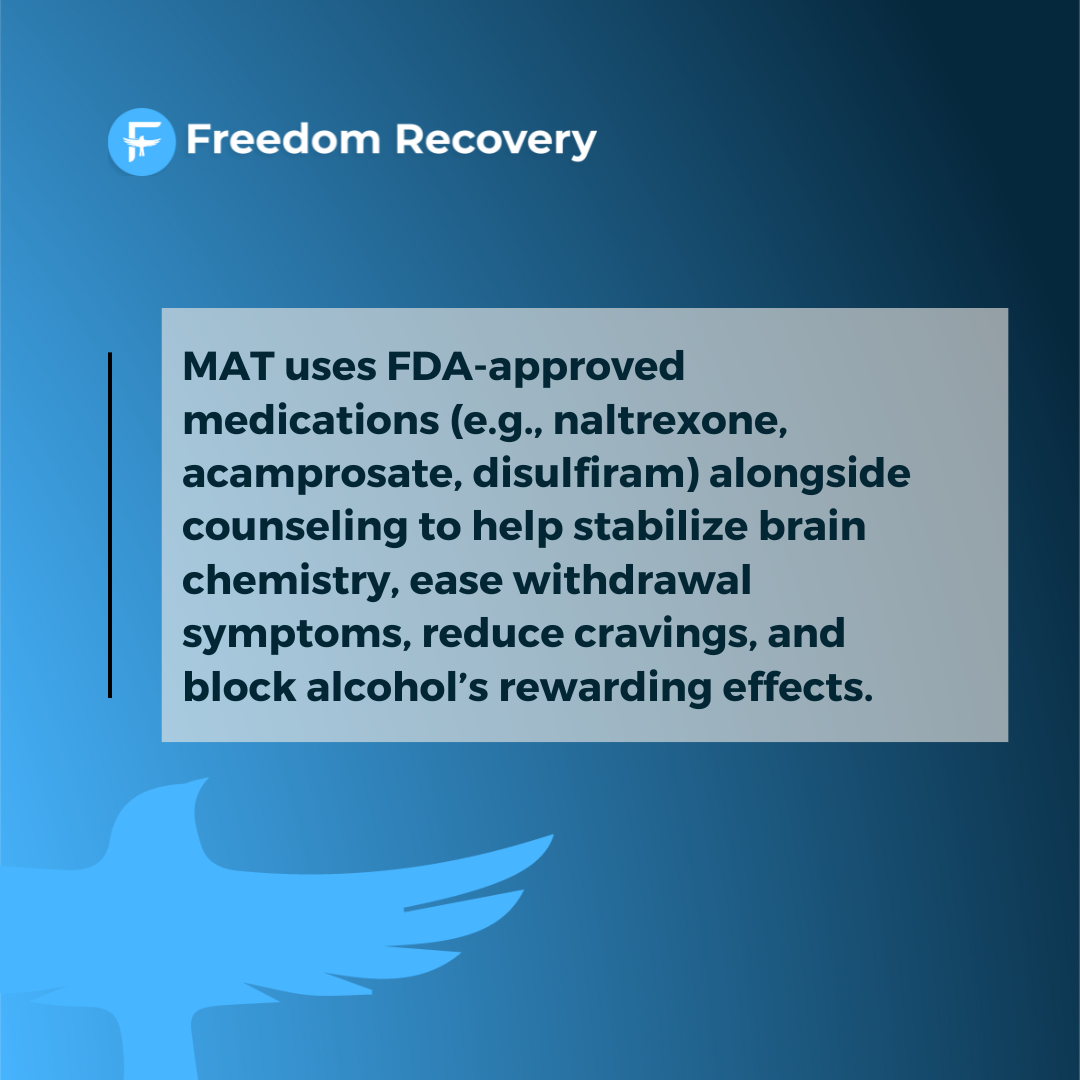

Taking the first step toward recovery from alcohol use disorder can stir up a lot of emotions, including uncertainty, hope, fear, and curiosity. And, often, the idea of exploring treatment programs raises more questions than answers: What will the process involve? Who will be there to help? How will this change everyday life?
Feeling unsure is only natural. Nonetheless, understanding what lies ahead can make the path forward feel steadier.
In this blog, we’ll talk about what to expect when searching for alcohol and drug treatment programs near me. Learn all about detox, the role of medication-assisted treatment, the need for integrated care if you happen to have co-occurring mental health conditions, aftercare strategies, and more.

Alcohol Use Disorder (AUD) is a chronic brain disease characterized by altered neural pathways that reinforce compulsive drinking. Recognizing AUD as more than occasional misuse lays the groundwork for tailored therapeutic planning.
To identify AUD, clinicians who offer alcohol treatment programs look for a number of signs. They observe patterns of impaired control over drinking, tolerance development, and withdrawal manifestations that impact daily functioning. These include:
The severity and duration of AUD guide the selection and intensity of treatment modalities, ensuring that you get personalized care that addresses both medical and behavioral needs. Usually, professionals assess factors like physical health, co-occurring conditions, and social support.
The first steps in alcoholic treatment programs combine thorough intake evaluations with collaborative treatment planning. The goal is to establish safety and clarity from day one.
Intake and assessment involve medical, psychological, and social evaluations that pinpoint your needs and risks. It comprises:
A personalized treatment plan is based on assessment findings. It integrates goals, schedules, and therapies suited to your AUD severity, medical needs, and personal preferences. In collaboration with clinicians, you will co-design a mix of detox protocols, therapy modalities, medication options, and aftercare strategies that foster commitment.
On the first day of rehab, you will usually experience orientation sessions, introductions to staff and peers, and a gentle schedule combining education, group meetings, and rest. Familiarizing yourself with facility rules, safety procedures, and daily routines builds structure and reassurance as they begin detox and counseling sessions.

Alcohol detoxification is the medically supervised process of removing alcohol from the body while managing withdrawal symptoms to prevent complications and promote stability. This process is critical to prevent complications such as seizures and delirium tremens, and it prepares the body for therapeutic interventions.
During withdrawal from AUD, symptoms can range from mild discomfort to serious medical emergencies. Each stage has its own timeline and recommended care:
During detox, licensed nurses and physicians monitor your vital signs, adjust medications to symptom severity, and offer nutritional support to restore balance. Continuous observation and 24/7 access to emergency care ensure both safety and comfort throughout this critical phase.
When you search for alcohol treatment programs near me, you’ll notice such programs encompass a spectrum of care levels — from fully residential to intensive outpatient options.
Inpatient treatment places you in a structured residential environment where 24-hour medical supervision, individual therapy, and group counseling promote immersion, accountability, and intensive support. This option suits those with severe AUD, co-occurring health issues, or unstable living situations.
Outpatient treatment allows you to live at home while attending scheduled therapy sessions multiple times per week, offering flexibility to maintain school, work, or family roles. This model supports individuals with mild to moderate AUD who demonstrate reliable adherence to program requirements.
PHPs provide daytime, hospital-level care with therapy, medical monitoring, and educational groups. In this setup, you’ll return to your home each evening, and it usually lasts 4 to 6 weeks.
On the other hand, IOPs reduce daily time commitments but maintain several therapeutic hours weekly. This program involves several clinic visits each week over the course of 8 to 12 weeks. It blends flexible scheduling with strong accountability, making it a good fit if you’re balancing treatment with work or family responsibilities.
A diverse array of therapies addresses the psychological, social, and behavioral dimensions of AUD.
Individual therapy supports recovery by encouraging exploration of personal triggers, developing coping skills, and setting measurable goals. These one-on-one sessions foster self-awareness and resilience through tailored cognitive and motivational techniques.
Group therapy promotes shared accountability, peer validation, and social learning. Here, you and fellow participants will exchange experiences, practice communication skills, and reinforce recovery motivations within a supportive community environment.
Family therapy involves loved ones to repair relationships, establish healthy boundaries, and educate caregivers about AUD dynamics. It strengthens the emotional support network you need for sustained sobriety.
Evidence-based behavioral therapies drive change through structured methods. Cognitive Behavioral Therapy (CBT) reshapes unhelpful thought patterns to reduce relapse risk. Meanwhile, Dialectical Behavior Therapy (DBT) builds emotional regulation and distress tolerance skills. Motivational interviewing enhances intrinsic motivation by resolving ambivalence toward change.

Willpower alone isn’t always enough to break free from AUD. And that’s why Medication-Assisted Treatment (MAT) can be such a powerful ally in recovery.
MAT uses FDA-approved medications (e.g., naltrexone, acamprosate, disulfiram) alongside counseling to help stabilize brain chemistry, ease withdrawal symptoms, reduce cravings, and block alcohol’s rewarding effects. By lowering these biological and psychological barriers, MAT allows you to focus more fully on therapy and behavioral change.
Your long-term recovery depends on more than completing treatment programs. It’s built on proactive aftercare, supportive community connections, and relapse-prevention strategies tailored to your life beyond the facility.
Aftercare services — such as continued counseling, alumni groups, and medication management — provide ongoing accountability, reinforce coping mechanisms, and prevent isolation.
Support groups like Alcoholics Anonymous offer a peer-led fellowship built on shared experiences, guided steps, and mentorship. They cultivate a sense of belonging and mutual encouragement that reinforces daily commitment to abstinence.
Relapse prevention strategies include identifying high-risk situations, developing coping plans, practicing stress-reduction techniques, and scheduling regular check-ins with counselors or sponsors to address challenges before they escalate.
Sober living homes provide transitional housing with structured environments, peer accountability, and life-skills training that bridge intensive treatment and independent living.
Finding the right treatment program and figuring out how to pay for it can feel like big steps. However, taking the time to explore your options and available financial support can make the path to recovery much more manageable.
Key considerations include accreditation status, program specialization (e.g., dual diagnosis), staff credentials, facility setting, proximity to home, and length of stay to align treatment intensity with personal circumstances.
Most private and public health plans cover treatment under mental health or substance use disorder benefits; understanding plan limits, pre-authorization requirements, and out-of-pocket costs ensures smoother access to services.
Several payment options can help make treatment programs more accessible.
Medicaid offers state-funded coverage for individuals who meet income and residency requirements, providing essential support for those with limited financial resources.
Many treatment centers also offer sliding-scale fees, adjusting costs based on verified income to reduce the burden for lower-income clients. In addition, scholarships and grants from nonprofit organizations can cover part or all of the cost and don’t need to be repaid, though they usually require an application and demonstrated financial need.
Some providers also offer payment plans, which break costs into smaller installments without interest, allowing you to spread expenses out over time while still getting the care you need.
Local directories maintained by health departments, professional associations, and treatment accreditation bodies list verified facilities, enabling you to compare services and credentials to make informed choices.

Integrated care models treat AUD and co-occurring mental health conditions at the same time, helping you heal more fully by addressing the connected symptoms and triggers that often fuel each other.
Dual diagnosis refers to the simultaneous presence of AUD and mental health disorders. Integrated treatment combines addiction and psychiatric services within a unified program to prevent fragmented care and conflicting approaches.
Anxiety disorders, major depressive disorder, and post-traumatic stress disorder frequently accompany AUD. Each influences relapse risk and requires coordinated intervention strategies.
Integrated treatment programs bring together cross-trained clinicians, joint therapy sessions, and coordinated care plans to ensure your medications, therapies, and recovery supports all work in sync to meet your full range of needs.
Looking for an ally in your alcohol addiction recovery journey? At Freedom Recovery, we offer personalized treatment programs designed to guide you through every stage, from detox and therapy to aftercare planning. Reach us today!

Discover how to navigate a drug addiction relapse and learn essential steps to strengthen your recovery.

Get support through an intensive outpatient program alcohol. Learn about its many benefits, from receiving therapy to enjoying better flexibility.

Learn about Intensive Outpatient Programs and how long they last for individuals dealing with addiction.